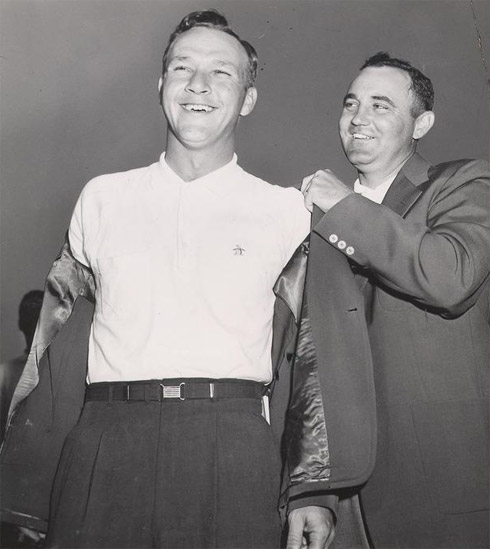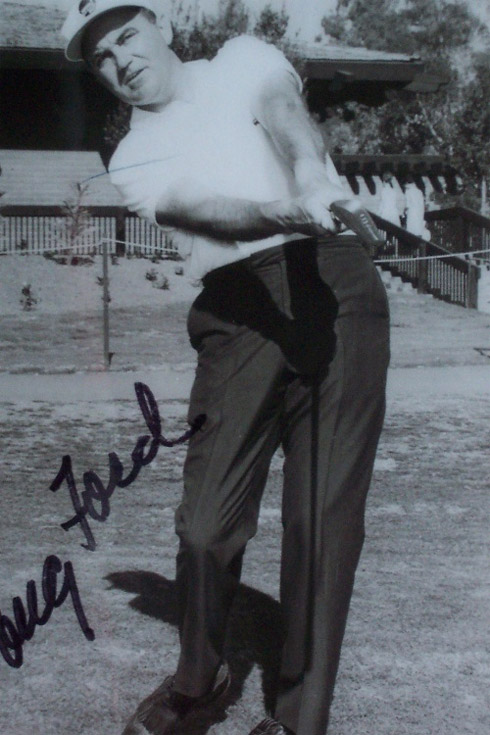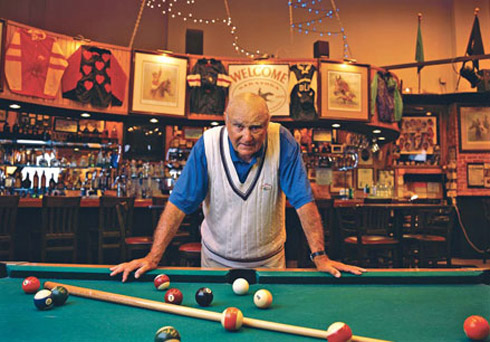 Lanny Wadkins was elected to the World Golf Hall of Fame in April 2009 for induction next November. It was about time. Wadkins has been passed over on the list of candidates for most of the last 10 years.
Lanny Wadkins was elected to the World Golf Hall of Fame in April 2009 for induction next November. It was about time. Wadkins has been passed over on the list of candidates for most of the last 10 years.
Still, Wadkins election wasn’t without drama. He was the only player elected from the PGA Tour ballot, which requires 65 percent of the vote from Hall of Famers, media, and golf executives. Wadkins got 61 percent of the vote. He made it in because of a provision to the 65 percent rule: if no one receives the minimum vote, the player with the highest percentage (provided it is over 50 percent) is elected. (Vijay Singh got in the same way in 2005.)
Wadkins absolutely deserves to be in the World Golf Hall of Fame. He’s earned it as both a player and a commentator. He should have been in long before this. But I want to talk about Doug Ford.
Ford finished second in voting this year with 46 percent of the vote (Mark O’Meara finished third with 31 percent).
Doug Ford has 19 PGA Tour victories with two majors (Wadkins has 21 with one). Ford competed on four Ryder Cup teams and earned more than a third of a million dollars on Tour in an era when a great season might gross $50K. It’s a very good résumé.
 Think maybe Ford wasn’t playing strong fields in those days? His era on Tour was shared by Ben Hogan, Sam Snead, Julius Boros, Cary Middlecoff, and Arnold Palmer. During the last few of Ford’s best years on tour, a plump, young Jack Nicklaus showed up and began to build his career wins.
Think maybe Ford wasn’t playing strong fields in those days? His era on Tour was shared by Ben Hogan, Sam Snead, Julius Boros, Cary Middlecoff, and Arnold Palmer. During the last few of Ford’s best years on tour, a plump, young Jack Nicklaus showed up and began to build his career wins.
Ford was inducted into the PGA Hall of Fame in 1975 by a vote of his peers. When the PGA Hall of Fame merged with the World Golf Hall of Fame in the 1980s, only PGA inductees with membership in both halls gained membership in the World Golf Hall of Fame. Ford was not one of the dual members.
Ford played before most of us were watching professional golf. I wanted to find out more about the guy who finished second in the Hall of Fame voting. Here’s what I learned.
Hole Number One: Fortunate Son
Doug Ford was born Douglas Michael Fortunato on June 8, 1922, in West Haven, Connecticut. Eventually, the promising athlete would face the tough choice between playing pro baseball or pro golf. In the end, perhaps genetics played a role. With a father and three uncles who were golf professionals, Doug may have been destined to pursue a living on the links.
Hole Number Two: What’s in a Name?
Ford’s father, who owned an indoor driving range in Manhattan for a time, changed the family’s name from Fortunato to Ford. It was a time when golf pros were primarily Scottish or British, and Italians were more likely to be caddies. He was not alone in his thinking. The 1935 Masters was won by a guy named Eugenio Saraceni at birth. The name on the trophy, however, is “Gene Sarazen.”
Hole Number Three: Patriotic Duty
During World War II, Ford served in the Coast Guard Air Division, patrolling the Caribbean. Today he is the owner of the Lacuna Golf Course in Lake Worth, Florida.
Hole Number Four: When You’re Hot, You’re Hot
In an 11-year stretch between 1952 and 1963, Ford won 19 times on the PGA Tour, including two majors (the 1955 PGA Championship and the 1957 Masters). He also prevailed in four non-tour events during the same time period. Years later, he would twice win his division of the Liberty Mutual Legends of Golf tournament – the Legendary Division (since renamed the Raphael Division) in 1987 with Jerry Barber and the Demaret Division in 1996 with Art Wall. He also played on four Ryder Cup teams.
Hole Number Five: It’s Not Just the Stats
 A player’s PGA Tour record is clearly not the sole factor, or even the determining factor, that gets players into the World Golf Hall of Fame. There are some big names who are in despite less grand records than Ford’s. Tom Kite has one less major and fewer PGA Tour victories (18). Tommy Bolt is in with one major and 15 PGA Tour titles. Chi Chi Rodriguez even made the hall without a major. Isao Aoki has only one PGA Tour win and nine Champions Tour victories (plus more than 50 worldwide wins, by the way).
A player’s PGA Tour record is clearly not the sole factor, or even the determining factor, that gets players into the World Golf Hall of Fame. There are some big names who are in despite less grand records than Ford’s. Tom Kite has one less major and fewer PGA Tour victories (18). Tommy Bolt is in with one major and 15 PGA Tour titles. Chi Chi Rodriguez even made the hall without a major. Isao Aoki has only one PGA Tour win and nine Champions Tour victories (plus more than 50 worldwide wins, by the way).
Hole Number Six: Membership Has Its Priviledges
The World Golf Hall of Fame bills induction into its membership as, “quite simply, golf’s highest honor.” Recognition in the Hall of Fame is bestowed on individuals who have “positively impacted the game of golf on the grandest scale.”
Aoki popularized golf in Asia. Tommy Bolt popularized club throwing. Tom Kite called a penalty on Craig Stadler for building a stance.
OK, those last couple are not really fair, but you get the point. “Positive impacts” are subjective at best. Some, like Chi Chi Rodriguez, Lee Trevino, and Aoki introducing golf to new audiences, are pretty easy to see. With others, like Bolt or Kite, it’s easy to argue that they should be in the hall, but more difficult to point to definitive reasons why. And when you try to find a reason why they’re in and Ford isn’t, there’s not a lot to go on.
Hole Number Seven: The Game is the Game
For Ford, the game did not begin and end with tournaments. In fact, some of his biggest money matches took place away from the galleries on tour.
Ford didn’t turn pro until he was 27, though he certainly could have competed at that level. The fact was that he was earning as much in gambling matches as he might have made on tour. In a 2007 Golf Digest interview, Ford explained what that life was like:
I was stationed in Florida during the war, and when it was over all the hustlers were around Miami Springs. One time, Al Besselink, who was in college at the time, told me there were a couple of rich kids from New Jersey who were looking for some action. They were pretty good players, but everyone knew I was better, so they wanted me to play their best ball. ‘I need some odds on that,’ I said, and after a little negotiating we settled on 4-1. I had $800 to my name, but the kids wanted to play for more than that, so Al found a way to put up $3,200 more. We played the match, and I birdied the last hole to win. I now had $3,200 as my share, and the kids wanted to play again the next day. I laid off some of the bet just to stay safe but beat the kids real badly. So I got $1,600 more, bringing my total to $4,800. It was honest golf. Nobody gave me strokes; it was always a matter of how many I had to give.
Hole Number Eight: Say It Like It Is

Perhaps Bob Goalby can best explain the omission of Doug Ford from the hall:
It’s a travesty Doug’s not in. Evidently, he alienated some people. Doug grew up in New York. He never gave anybody any quarter. He had to be the first on the bus, the first to get off, the first to pick up his check. It’s the way he grew up in New York, but he was respected by his peers. He was always fighting the Tour for the underdog. I think his being outspoken hurt him.
Hole Number Nine: An Old Master
Another way that Ford probably hurt himself is by playing long past his prime. His high scores at the Masters in the 1980s and 90s may have influenced a lot of younger voters and hurt his chances at election.
In 2001, Doug Ford played in his 49th Masters tournament. He held the record for most appearances for three years… until Arnold Palmer played his 50th in 2004. Gary Player eclipsed them both, of course. Last month, Player made his 52nd run at the green jacket (though, it was more of a trot this year).
Ford is true to his nature (and I think that’s a good thing). In April, at age 86 and soon after the results of the World Golf Hall of Fame voting came out, Ford was out on the course playing in the Liberty Mutual Legends of Golf at the Savannah Harbor Golf Resort. Well on the way to a last place finish with partner Billy Maxwell, he hit a shot that would never occur to most of us to attempt. He played a “two-finger” fade (with just two fingers of his right hand on the club) with his driver on the 155-yard, par three 17th that hit the flag on the fly. He made the 12-foot birdie putt.
There’s still hope for Ford’s inclusion in the hall. In addition to being voted in by the World Golf Hall of Fame’s PGA Tour Voting Body, which consists of more than 200 journalists, historians and golf dignitaries, Ford can also get in through the Veteran’s Category. Ford would have to be selected by members of the World Golf Foundation Board of Directors’ Selection Committee, a body made up of representatives of seven major golf organizations (Augusta National, European Tour, LPGA, PGA Tour, PGA, the R&A and the USGA).
Perhaps in 2010, when he’s 88, Doug Ford will finally get his long overdue invitation to join the Hall of Fame.
Photo Credits: © Augusta.com, The City of Yonkers, andGolf Digest.

Great article.
A friend who does some golf writing and is an editor at one of the magazines talked to a few Senior Tour players about Ford a few years ago. This was when Augusta National sent the infamous letter to old champions politely asking them to bow out if they were no longer competitive (a letter they later partially recanted).
Of course all the people he talked to wished to remain anonymous in quotes, and it all sounds like gossip, but the general opinion was that Doug Ford was not exactly a nice person. Quite the contrary.
So I think you’re right that there may be some personal element which has hurt his candidacy, by alienating voters.
Funny–I had no idea his resume was that good. I thought he had only won the Masters, and I never knew he won 19 tournaments. I would never have picked him for a hall of fame player.
I never thought of like Lanny as a HOF player, either, but when I look at the numbers, I was wrong. For me, the 21 tour wins means more than the 1 major; winning 1 major alone shouldn’t be enough to earn HOF status. Twenty-one tour wins is very, very good, though. And he played in the Nicklaus/Watson/Norman days, so there were always very good players in the fields.
Only 28 men in golf history have more Tour wins than Lanny Wadkins.
Other inductees, with comparable records of wins/majors, are: Hale Irwin 20/3, Norman 20/2, Hubie Green 19/2, Kite 19/1.
How about these guys, who as far as I know aren’t in:
O’Meara 16/2, Couples 15/1, Pavin 15/1, Davis Love III 20/1
Wins matter, but HOF athletes, I think, should also show sustained excellence over years. But it’s tough, in retrospect, to determine how much “sustained excellence” a golfer has had in his career. Stats are tough to come by (and interpret) in golf, but a good one would be to get an idea of a player’s rank in earnings through the years. I guy who hasn’t won as much but was high on the money list for a long time might be considered…
I’m not sure they deserve entry, but I’d like to see both Davis Love III and Fred Couples in the HOF. Both have had pretty long careers and have competed at a very high level in their 40s, although injuries have derailed both players quite a bit. Their success in world golf team championships is impressive. Couples, while a “nice guy” is, to this day, an immensely talented guy that, well into his 40s and nearing 50, can still threaten to win regular tour events. I think players of that mid-80s through late 90s era are interesting, because they are sort of transitional players. Their games resemble the more classical games of Nicklaus and Watson, while introducing or foreshadowing the modern power game of Woods and Mickelson. Since they are sandwiched between two great eras, I think they potentially get overlooked.
Great article, George. Thanks for posting it.
Good read George.
This kind of stuff beats the hell out of stories (and replies) about hating Phil or loving Tiger.
I was a caddy at Myopia hunt club when Doug Ford won the PGA and the Masters. There was alot of talk around the caddy yard about Ford and how he typically “welched” on caddy fees. Not sure where it came from. The pro at Myopia was a great New England player by the name of John Thoren.
One reason that Doug Ford may have been overlooked is because he was known and recognized as the very best “Match Play” golfer of all time . That was through to my recolection about 1960.Seems he was seen as a New Yorker that was a “cheap skate and a prick”, as a typical discerning expression of the times dictated. Although he won from 19-23 tour tournaments (depending on who is doing the counting) plus two majors, the 1955 PGA, and the 1957 Masters, he was still known for his match play prowess.Match Play,other than the Ryder Cup, in American golf does not get you in to the Hall of Fame and he could not shake the bad image he caused himself in the sacred world of the caddy. He generally speaking was not very well liked it seems.